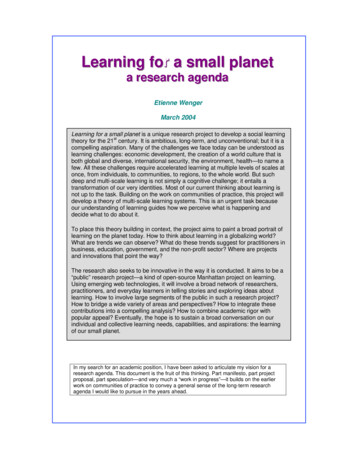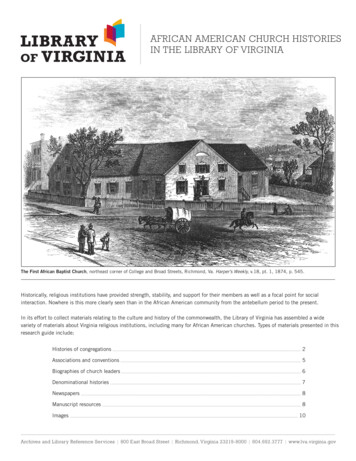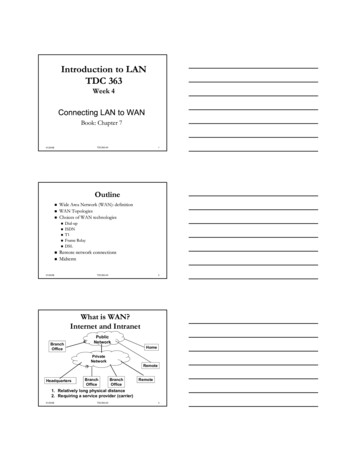
Transcription
THE HISTORY OF HERODOTUSTranslated into Englishby G. C. MACAULAY, M.A.IN TWO VOLUMESVOLUME I{e Herodotou diathesis en apasin epieikes, kai tois men agathoissunedomene, tois de kakois sunalgousa}.--Dion. Halic.{monos 'Erodotos 'Omerikhotatos egeneto}.--Longinus.PREPARER'S NOTEThis text was prepared from an edition dated 1890, published byMacMillan and Co., London and New York.Greek text has been transliterated and marked with brackets, as inthe opening citation above.PREFACEIf a new translation of Herodotus does not justify itself, it willhardly be justified in a preface; therefore the question whether itwas needed may be left here without discussion. The aim of thetranslator has been above all things faithfulness--faithfulness to themanner of expression and to the structure of sentences, as well as tothe meaning of the Author. At the same time it is conceived that thefreedom and variety of Herodotus is not always best reproduced by suchsevere consistency of rendering as is perhaps desirable in the case ofthe Epic writers before and the philosophical writers after his time:nor again must his simplicity of thought and occasional quaintness bereproduced in the form of archaisms of language; and that not onlybecause the affectation of an archaic style would necessarily beoffensive to the reader, but also because in language Herodotus is not
archaic. His style is the "best canon of the Ionic speech," marked,however, not so much by primitive purity as by eclectic variety. Atthe same time it is characterised largely by the poetic diction of theEpic and Tragic writers; and while the translator is free to employall the resources of modern English, so far as he has them at hiscommand, he must carefully retain this poetical colouring and by allmeans avoid the courtier phrase by which the style of Herodotus hastoo often been made "more noble."[1]As regards the text from which this translation has been made, it isbased upon that of Stein's critical edition (Berlin, 1869-1871), thatis to say the estimate there made of the comparative value of theauthorities has been on the whole accepted as a just one, rather thanthat which depreciates the value of the Medicean MS. and of the classto which it belongs. On the other hand the conjectural emendationsproposed by Stein have very seldom been adopted, and his text has beendeparted from in a large number of other instances also, which willfor the most part be found recorded in the notes.As it seemed that even after Stein's re-collation of the Medicean MS.there were doubts felt by some scholars[2] as to the true reading insome places of this MS., which is very generally acknowledged to bethe most important, I thought it right to examine it myself in allthose passages where questions about text arise which concern atranslator, that is in nearly five hundred places altogether; and theresults, when they are worth observing, are recorded in the notes. Atthe same time, by the suggestion of Dr. Stein, I re-collated a largepart of the third book in the MS. which is commonly referred to as F(i.e. Florentinus), called by Stein C, and I examined this MS. also ina certain number of other places. It should be understood thatwherever in the notes I mention the reading of any particular MS. byname, I do so on my own authority.The notes have been confined to a tolerably small compass. Theirpurpose is, first, in cases where the text is doubtful, to indicatethe reading adopted by the translator and any other which may seem tohave reasonable probability, but without discussion of theauthorities; secondly, where the rendering is not quite literal (andin other cases where it seemed desirable), to quote the words of theoriginal or to give a more literal version; thirdly, to add analternative version in cases where there seems to be a doubt as to thetrue meaning; and lastly, to give occasionally a short explanation, ora reference from one passage of the author to another.For the orthography of proper names reference may be made to the noteprefixed to the index. No consistent system has been adopted, and the
result will therefore be open to criticism in many details; but theaim has been to avoid on the one hand the pedantry of seriouslyaltering the form of those names which are fairly established in theEnglish language of literature, as distinguished from that ofscholarship, and on the other hand the absurdity of looking to Latinrather than to Greek for the orthography of the names which are not soestablished. There is no intention to put forward any theory aboutpronunciation.The index of proper names will, it is hoped, be found more completeand accurate than those hitherto published. The best with which I wasacquainted I found to have so many errors and omissions[3] that I wascompelled to do the work again from the beginning. In a collection ofmore than ten thousand references there must in all probability bemistakes, but I trust they will be found to be few.My acknowledgments of obligation are due first to Dr. Stein, both forhis critical work and also for his most excellent commentary, which Ihave had always by me. After this I have made most use of the editionsof Krüger, Bähr, Abicht, and (in the first two books) Mr. Woods. As totranslations, I have had Rawlinson's before me while revising my ownwork, and I have referred also occasionally to the translations ofLittlebury (perhaps the best English version as regards style, butfull of gross errors), Taylor, and Larcher. In the second book I havealso used the version of B. R. reprinted by Mr. Lang: of the firstbook of this translation I have access only to a fragment written outsome years ago, when the British Museum was within my reach. Otherparticular obligations are acknowledged in the notes.---------NOTES TO PREFACE[1] See the remarks of P.-L. Courier (on Larcher's version) in thepreface to his specimens of a new translation of Herodotus(/Œuvres complètes de P.-L. Courier/, Bruxelles, 1828).[2] Mr. Woods, for example, in his edition of the first book(published in 1873) gives a list of readings for the first andsecond books, in which he almost invariably prefers the authorityof Gronovius to that of Stein, where their reports differ. In sodoing he is wrong in all cases (I think) except one, namely i. 134{to degomeno}. He is wrong, for examine, in i. 189, where the MS.has {touto}, i. 196 {an agesthai}, i. 199 {odon}, ii. 15 {te de},ii. 95 {up auto}, ii. 103 {kai prosotata}, ii. 124 {to addo}(without {dao}), ii. 181 {no}. Abicht also has made severalinaccurate statements, e.g. i. 185, where the MS. has {es ton
Euphreten}, and vii. 133 {Xerxes}.[3] For example in the index of proper names attached to Stein'sannotated edition (Berlin, 1882), to which I am under obligation,having checked my own by it, I find that I have marked upwards oftwo hundred mistakes or oversights: no doubt I have been saved byit from at least as many.THE HISTORY OF HERODOTUSBOOK ITHE FIRST BOOK OF THE HISTORIES, CALLED CLIOThis is the Showing forth of the Inquiry of Herodotus ofHalicarnassos, to the end that[1] neither the deeds of men may beforgotten by lapse of time, nor the works[2] great and marvellous,which have been produced some by Hellenes and some by Barbarians, maylose their renown; and especially that the causes may be rememberedfor which these waged war with one another.1. Those of the Persians who have knowledge of history declare thatthe Phenicians first began the quarrel. These, they say, came fromthat which is called the Erythraian Sea to this of ours; and havingsettled in the land where they continue even now to dwell, setthemselves forthwith to make long voyages by sea. And conveyingmerchandise of Egypt and of Assyria they arrived at other places andalso at Argos; now Argos was at that time in all points the first ofthe States within that land which is now called Hellas;--thePhenicians arrived then at this land of Argos, and began to dispose oftheir ship's cargo: and on the fifth or sixth day after they hadarrived, when their goods had been almost all sold, there came down tothe sea a great company of women, and among them the daughter of theking; and her name, as the Hellenes also agree, was Io the daughter ofInachos. These standing near to the stern of the ship were buying ofthe wares such as pleased them most, when of a sudden the Phenicians,passing the word from one to another, made a rush upon them; and thegreater part of the women escaped by flight, but Io and certain otherswere carried off. So they put them on board their ship, and forthwithdeparted, sailing away to Egypt. 2. In this manner the Persians report
that Io came to Egypt, not agreeing therein with the Hellenes,[3] andthis they say was the first beginning of wrongs. Then after this, theysay, certain Hellenes (but the name of the people they are not able toreport) put in to the city of Tyre in Phenicia and carried off theking's daughter Europa;--these would doubtless be Cretans;--and sothey were quits for the former injury. After this however theHellenes, they say, were the authors of the second wrong; for theysailed in to Aia of Colchis and to the river Phasis with a ship ofwar, and from thence, after they had done the other business for whichthey came, they carried off the king's daughter Medea: and the king ofColchis sent a herald to the land of Hellas and demanded satisfactionfor the rape[4] and to have his daughter back; but they answered that,as the Barbarians had given them no satisfaction for the rape of Iothe Argive, so neither would they give satisfaction to the Barbariansfor this.3. In the next generation after this, they say, Alexander the son ofPriam, having heard of these things, desired to get a wife for himselfby violence[4] from Hellas, being fully assured that he would not becompelled to give any satisfaction for this wrong, inasmuch as theHellenes gave none for theirs. So he carried off Helen, and theHellenes resolved to send messengers first and to demand her back withsatisfaction for the rape; and when they put forth this demand, theothers alleged to them the rape of Medea, saying that the Helleneswere now desiring satisfaction to be given to them by others, thoughthey had given none themselves nor had surrendered the person whendemand was made.4. Up to this point, they say, nothing more happened than the carryingaway of women on both sides; but after this the Hellenes were verygreatly to blame; for they set the first example of war, making anexpedition into Asia before the Barbarians made any into Europe. Nowthey say that in their judgment, though it is an act of wrong to carryaway women by force, it is a folly to set one's heart on takingvengeance for their rape, and the wise course is to pay no regard whenthey have been carried away; for it is evident that they would neverbe carried away if they were not themselves willing to go. And thePersians say that they, namely the people of Asia, when their womenwere carried away by force, had made it a matter of no account, butthe Hellenes on account of a woman of Lacedemon gathered together agreat armament, and then came to Asia and destroyed the dominion ofPriam; and that from this time forward they had always considered theHellenic race to be their enemy: for Asia and the Barbarian raceswhich dwell there the Persians claim as belonging to them; but Europeand the Hellenic race they consider to be parted off from them.
5. The Persians for their part say that things happened thus; and theyconclude that the beginning of their quarrel with the Hellenes was onaccount of the taking of Ilion: but as regards Io the Phenicians donot agree with the Persians in telling the tale thus; for they denythat they carried her off to Egypt by violent means, and they say onthe other hand that when they were in Argos she was intimate with themaster of their ship, and perceiving that she was with child, she wasashamed to confess it to her parents, and therefore sailed away withthe Phenicians of her own will, for fear of being found out. These arethe tales told by the Persians and the Phenicians severally: andconcerning these things I am not going to say that they happened thusor thus,[4a] but when I have pointed to the man who first within myown knowledge began to commit wrong against the Hellenes, I shall goforward further with the story, giving an account of the cities ofmen, small as well as great: for those which in old times were greathave for the most part become small, while those that were in my owntime great used in former times to be small: so then, since I knowthat human prosperity never continues steadfast, I shall make mentionof both indifferently.*****6. Crœsus was Lydian by race, the son of Alyattes and ruler of thenations which dwell on this side of the river Halys; which river,flowing from the South between the Syrians[5] and the Paphlagonians,runs out towards the North Wind into that Sea which is called theEuxine. This Crœsus, first of all the Barbarians of whom we haveknowledge, subdued certain of the Hellenes and forced them to paytribute, while others he gained over and made them his friends. Thosewhom he subdued were the Ionians, the Aiolians, and the Dorians whodwell in Asia; and those whom he made his friends were theLacedemonians. But before the reign of Crœsus all the Hellenes werefree; for the expedition of the Kimmerians, which came upon Ioniabefore the time of Crœsus, was not a conquest of the cities but aplundering incursion only.[6] 7. Now the supremacy which had belongedto the Heracleidai came to the family of Crœsus, called Mermnadai, inthe following manner:--Candaules, whom the Hellenes call Myrsilos, wasruler of Sardis and a descendant of Alcaios, son of Heracles: forAgron, the son of Ninos, the son of Belos, the son of Alcaios, was thefirst of the Heracleidai who became king of Sardis, and Candaules theson of Myrsos was the last; but those who were kings over this landbefore Agrond, were descendants of Lydos the son o
ii. 95 {up auto}, ii. 103 {kai prosotata}, ii. 124 {to addo} (without {dao}), ii. 181 {no}. Abicht also has made several inaccurate statements, e.g. i. 185, where the MS. has {es ton . Euphreten}, and vii. 133 {Xerxes}. [3] For example in the index of proper names attached to Stein's annotated edition (Berlin, 1882), to which I am under obligation, having checked my own by it, I find that I .











